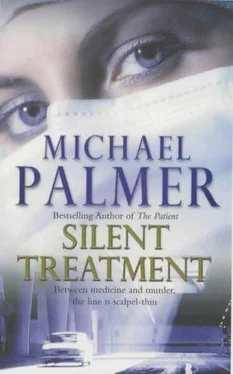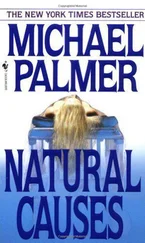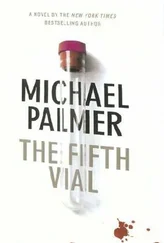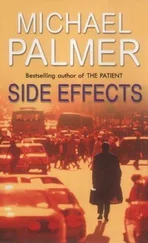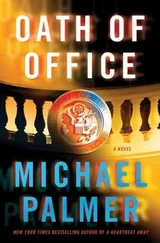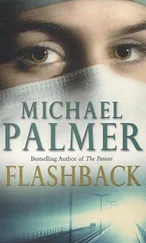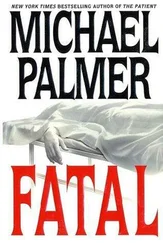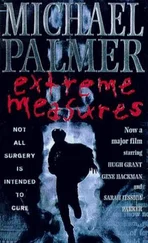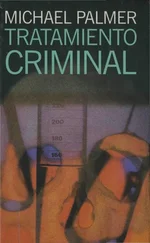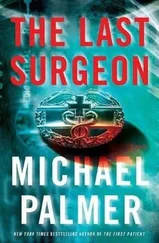Michael Palmer - Silent Treatment
Здесь есть возможность читать онлайн «Michael Palmer - Silent Treatment» весь текст электронной книги совершенно бесплатно (целиком полную версию без сокращений). В некоторых случаях можно слушать аудио, скачать через торрент в формате fb2 и присутствует краткое содержание. Жанр: Триллер, на английском языке. Описание произведения, (предисловие) а так же отзывы посетителей доступны на портале библиотеки ЛибКат.
- Название:Silent Treatment
- Автор:
- Жанр:
- Год:неизвестен
- ISBN:нет данных
- Рейтинг книги:4 / 5. Голосов: 1
-
Избранное:Добавить в избранное
- Отзывы:
-
Ваша оценка:
- 80
- 1
- 2
- 3
- 4
- 5
Silent Treatment: краткое содержание, описание и аннотация
Предлагаем к чтению аннотацию, описание, краткое содержание или предисловие (зависит от того, что написал сам автор книги «Silent Treatment»). Если вы не нашли необходимую информацию о книге — напишите в комментариях, мы постараемся отыскать её.
Silent Treatment — читать онлайн бесплатно полную книгу (весь текст) целиком
Ниже представлен текст книги, разбитый по страницам. Система сохранения места последней прочитанной страницы, позволяет с удобством читать онлайн бесплатно книгу «Silent Treatment», без необходимости каждый раз заново искать на чём Вы остановились. Поставьте закладку, и сможете в любой момент перейти на страницу, на которой закончили чтение.
Интервал:
Закладка:
'If people keep talking, I wonder if he'llstart throwing things like he does in the OR,' Josephson whispered to Harry.'I've heard he's had enough complaints filed by scrub nurses to fill the phonebook. The hospital doesn't do anything about his tantrums because they'reafraid he'll take his act somewhere else. The guy brings in millions ofdollars.'
'Whatever Caspar wants, Caspar gets,'Harry sang to the 'Lola' tune.
'I don't have very good vibes about thisat all, Harry.'
'I can't think of any reason you should.'
Caspar Sidonis, in his early forties, hada matinee idol's good looks, which he augmented by being impeccably andexpensively dressed at all times. He had been first in his class at Harvard Medand never, ever let anyone forget it. He had also won MMC's tennis and squashchampionships several years running, and was rumored to have been a collegiateboxing champion.
'Green Dolphin Street' intensified inHarry's head. Funk or no funk, he did not want to be told what he could andcould not do as a physician — not by HMOs, not by insurance companies, andespecially not by a pompous, overblown, crank-'em-through super-technician likeSidonis. He glanced around the hall at the other GPs, thinking about all thoseyears of study, the countless hours of continuing-ed courses, their willingnessto endure the low prestige and even lower reimbursement that went with being afamily practitioner. They deserved to be rewarded, not restricted.
'Harry, for chrissakes, say something.They're crucifying you.'
Doug Atwater, seated to Harry's right,clenched his fist in frustration as, one by one, the Sidonis committee'srecommendations were presented to the medical staff. To Harry's left, SteveJosephson was shaking his head in disbelief. He had tried arguing against thefirst of the committee's proposals, which required that a board-certifiedobstetrician be present for all deliveries. Josephson had once made headlineswhen, as a passenger stuck in a disabled subway car, he had successfullydelivered the twins of one of the other passengers. Now, it seemed possiblethat deliveries in such situations would be the only ones he would be allowedto perform.
The vote, despite Josephson's emotionalarguments and well-publicized heroics, was nearly unanimous. Only the three GPswho still did deliveries voted nay. The rest abstained, perhapsbelieving that the staff would conclude they were responsible enough to policethemselves, and back off from supporting the other restrictive resolutions.
'There goes the new refrigerator,' Harrysaid.
The next resolution, requiring GPs to turnover their Coronary Care Unit patients to a cardiologist or internist, passedeasily. The cardiologist who had taken over Clayton Miller's care was one ofthe few dissenters who wasn't a GP. Then came the vote to limit surgicalparticipation by GPs to first assisting only. Again Sidonis's committeeprevailed.
'History will refer to this next one asthe Marv Lorello Proviso,' Harry whispered as discussion began on the last ofthe committee's proposals.
'It is recommended,' Sidonis began,adjusting the Ben Franklin reading glasses that Harry sensed he wore more forhis image than for his vision, 'that all suturing done in the Manhattan MedicalCenter emergency ward by a non-surgical specialist be approved in advance bythe senior emergency physician on duty.'
The murmur around the amphitheatersuggested that many were surprised by this final, and perhaps most humiliatingproposal. Harry had had advance warning, but the words stung nevertheless.
'There have been,' Sidonis went on, 'anumber of cases reported to our complaint committee, and to our liabilitycarrier, in which improper technique was used or faulty judgment displayed bycertain non-specialists. Mrs. Brenner of our risk-management office has assuredme that developing some sort of internal pretreatment screening policy couldsignificantly reduce the number of claims against our non-specialty staffmembers.'
He glanced vaguely in Marv Lorello'sdirection, and several dozen pairs of eyes followed. Lorello had joined thestaff just a few years before after serving three years on a reservation in theIndian Health Service. He had impressive academic credentials and a refreshingidealism about practicing medicine. The malpractice suit — his first — and thesubsequent fallout from it had hurt him deeply. Harry did his best to remainexternally placid. But 'Green Dolphin Street' was playing on, up-tempo now andlouder.
Then suddenly, the music stopped. It tookseveral seconds before Harry realized he was on his feet, his six-one frame thecenter of attention of everyone in the amphitheater. He cleared his throat. Thefaces stared up at him, waiting.
'If it's all right with the chairman,' heheard himself saying, 'I… um … I guess there are a few things I need to getoff my chest before we vote on this last — and for the family practitioners,most degrading — proposal of this commission.' He paused for objections andhalf felt Sidonis was about to voice one. The silence, however, was total.'Okay. Thanks. It's not my intention to belittle anyone's specialty by implyingthat someone with less training might be able to do exactly what it is they do.But I do want to stress that we generalists are well trained to do some ofthose things. We are board-certified in family medicine, not half-assedmedicine. We went to medical school just as you did, we had residencies just asyou did, we care about our patients and continue our education just as you do,and most important, we recognize our limitations, just as I hope you do.
'Most of us can handle being treated withthe sort of disdain I've heard expressed here today.' He looked pointedlyacross the auditorium toward Sidonis. The impressive silence continued. Not acough. Not a clearing of a throat. Not a creaking of a seat. 'We can handle itbecause we believe in the specialty of medicine we have chosen. Now, we'vebecome something of a convenience to the insurance companies and HMOs. Theycall us primary care physicians. By that they mean medical traffic cops,screening the mundane and insignificant complaints so that the much moreexpensive specialists won't have to deal with them. And that's okay. Most of ushave adjusted to that new order, too. Just as we'll adjust to first assistingon simple appendectomies and other operations we have performed dozens of timesourselves, or turning our coronary care patients over to someone they don'tknow.
'But this — ' Harry gestured to the hugescreen behind Sidonis, on which was displayed the last of the committee'srecommendations. 'This I simply cannot accept. You know, we doctorspersistently lay the blame for the malpractice crisis on lawyers. There are toomany lawyers. The contingency system is wrong. The way they advertise isinflammatory. Well, that may be so. But that is hardly the whole story.Patients don't know us anymore. We don't portray ourselves as partners in thebusiness of keeping them healthy. Instead, most of us come across as just whatwe are — specialists, interested only in making sure that the body part we havebecome expert at works properly. Hey, lady, I'm sorry you have to get toBrooklyn, I never drive past Forty-second Street. Well, I know how to suture.I've sutured wounds you wouldn't believe in situations you wouldn't believe.I'm damn good at it. So is Dr. Josephson, here, and Marv Lorello, and every oneof the rest of us who chooses to sew up our patients when they cut themselves.I don't need to be told what I can and cannot fix. None of us does.
'So I say, enough. The return tothe kinder, gentler days of the rumpled, overworked family practitioner makesfor great conversation around the medical cocktail party circuit. But when thechips are down, no one s ready to challenge the great god science, and to saythat there's still a place for doctors who know their patients as whole people,and want to care for them regardless of what is wrong. I wish that instead oflimiting this session to medical staff members you had invited some of thosepatients to be here. Once you understand what having a doctor means tothem, perhaps you will remember what being a doctor should mean to us.These proposals are all humiliating and unnecessary. But this one is even worsethan that. Don't pass it.'
Читать дальшеИнтервал:
Закладка:
Похожие книги на «Silent Treatment»
Представляем Вашему вниманию похожие книги на «Silent Treatment» списком для выбора. Мы отобрали схожую по названию и смыслу литературу в надежде предоставить читателям больше вариантов отыскать новые, интересные, ещё непрочитанные произведения.
Обсуждение, отзывы о книге «Silent Treatment» и просто собственные мнения читателей. Оставьте ваши комментарии, напишите, что Вы думаете о произведении, его смысле или главных героях. Укажите что конкретно понравилось, а что нет, и почему Вы так считаете.
